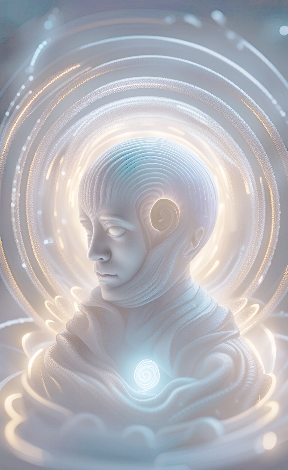Higher bodies (soul). Buddhiac body
Ignorance of the truth does not prevent a person from being honest.
Buddhiac Body
Keywords: life values and programs, beliefs, stable circumstances; emotional life.
The buddhiac body records the main plots of a person's external and internal life without special details, i.e., specific events, which are reflected only in the causal body.
The social view of the buddhiac body is reflected in the main points of brief biographies: born here and there at such and such a time, into such and such a social stratum, received some education, married so-and-so, worked wherever possible, had six children, composed three symphonies in D major and one cantata in D-sharp minor; died in obscurity and poverty, by which he became eternally famous and posthumously received the titles of laureate of the philosophical prize and doctor of philosophy.
It is much easier to talk about the buddhiac body than about the atmanic body - its values are significantly more concrete and more accurately expressed in words than the ideals of the atmanic body. And the first thing that strikes the eye when considering them together is the obvious discrepancy between the two: values often contradict ideals or have no relation to them. Moreover, with a weak atmanic body, such a formulation of the question may even surprise a person: "What kind of agreement? I have no ideals, and no faith either - but I have principles that I try not to violate: to live honestly, not to borrow from anyone, to rely only on myself, to set my own goals and achieve them without sparing effort."
Buddhiac values are the main life (existential) values of a person, that is, what they tend to achieve and protect over long periods of their life.
Moving to the material plane, one can say this: buddhiac values are what cannot be bought for money, or at least for average money available to a given person. This is, for example, stable long-term friendship; generally, another person's loyalty; social status; qualification in any type of work; connections with the powerful of this world, what is called "influence"; finally, wealth, best of all in real estate.
From atmanic values, that is, (true) ideals, buddhiac ones differ in greater concreteness: they are capable of determining the main direction of a person's life path over periods measured in years, and sometimes decades.
A change in buddhiac values is perceived by a person as a fundamental change in fate: before, they lived for one thing, and now their life is filled with something completely different.
Existential values are those that deeply concern a person, and they never really forget them; all others, on the contrary, they perceive extremely superficially, and the joys and sorrows associated with them quickly fade from their memory.
Whole and purposeful people are distinguished by a narrow spectrum of well-coordinated buddhiac values. Conversely, their discord and a wide range cause a person to rush through life, sometimes committing inexplicable acts.
The buddhiac body and the effects associated with its meditations are at the center of attention of psychologists, psychotherapists, and psychoanalysts, as well as all "human experts." The effect that one constantly encounters when studying the buddhiac body is that its true values, as a rule, are mostly suppressed into the subconscious, and this repressed part strongly contradicts or, at least, poorly harmonizes with what is reflected in consciousness. As a rule, existential values are suppressed when a person realizes that they are unable to achieve them, and this experience is too difficult to carry with them constantly, and the age-old wisdom of the subconscious suggests: bury it, forget it, and plant grass. However, the grass grows not simple, but speaking, and the reader guesses what it says...
Repressed existential values in the subconscious make way for parasites, and this place is occupied by various sham values, which, however, do not feel too confident, since true values do not die in the subconscious - they seem to go underground and constantly manifest themselves indirectly, sometimes in a way that is completely incomprehensible to a person and even ugly. Of course, such a situation does not add peace of mind, nor order in affairs, but figuring out what's wrong can be quite difficult.
This is especially true for sham values formed in childhood under the influence of family and social egregors. Thus, inside a big uncle, concerned with politics and serious work, a little boy is discovered, offended by his older sister and striving to prove to her that he can do more than she can. And although by all outward signs this has long been established, she is still five years older than him, and he subconsciously cannot come to terms with this circumstance. The fact is that in childhood, along with the negative image of the dominant older sister, a certain aggressive buddhiac figure with protective functions was formed in the person, that is, capable of organizing a long-term (many years) defense in a fortress besieged by a superior enemy.
The image of the sister - a negative buddhiac value - can be superimposed on other people. Therefore, a psychotherapist, to whom our hero may appear with a complaint about nervous exhaustion due to the incessant aggression from his wife (boss, daughter), may not deal with clarifying the origin and distant causes of the conflict, but consider it in the current phase. It must be assumed that in the client's story about his misfortunes and the enemy's extortion, a note of pride in himself will flash: to endure so many years of siege without reinforcements and allies! - and it is here that his actual buddhiac value manifests itself - an aggressive figure raised by him for self-defense and now controlling a significant part of his main life plots. If a person can voluntarily recognize its existence and renounce it, by tracking and changing their reactions (and this is a great sacrifice on their part), then along with it, the far-fetched negative image of the sister from other people will also disappear.
What are the peculiarities of buddhiac diplomacy? It is primarily the concern for the purity of the buddhiac body, that is, cleansing it from sham values that divert most of the body's energy but give nothing in return. Furthermore, having identified true existential values, one should establish permanent contacts with the corresponding egregors through them and give the latter official guarantees of devoted (within the agreed framework) service.
A true ideal fills life with meaning, whose authority for a person is absolute. A true value fills a section of life's path with a (more concrete) meaning, not only at the end, but throughout its entire journey. In other words, a true ideal gives a person the energy of inspiration immediately, that is, long before the fulfillment of their mission, unlike a dummy one, which promises reward after the completion of the mission, and gives nothing before that. Buddhiac energy is denser and more tangible than atmanic energy - this is, for example, the enthusiasm that allows a young musician to perform monotonous exercises for hours without much fatigue, and a good student to study the most difficult subjects for days on end.
Internal values, generally speaking, are more important than external ones, although the social subconscious believes the opposite. Without denying such a virtue as, say, perseverance in achieving a set goal, society will still not compare it with obtaining a Ph.D. If, when asked: "What have you achieved by your forty years?" - a man answers: "I became a workshop manager," and a woman: "I raised three children" - society gives both an undoubted credit: the person has succeeded. If the answer is: "I acquired humility, stopped grumbling about fate and getting annoyed with loved ones," then we will most likely shrug our shoulders and ask: "Well, what did you actually do?"
In general, practically all positive emotional qualities: modesty, kindness, humility, patience, striving for perfection, respect for the outside world, and many others that moralists and preachers love to talk about, are buddhiac values; innate or acquired through long labor and self-work. But, of course, there is a big difference between innate patience and patience developed by a person as a result of many years of persistent struggle with their innate anarchy, inconsistency, quick temper, and aggressiveness - the developed value, as a rule, is significantly higher than the inherited one (although, to be fair, it must be said that this is not always the case - nature usually does not tolerate strict rules. For example, there are people with infinite innate kindness that surpasses any developed one).
A person with a strong atmanic body is perceived as passionately striving somewhere, not always clearly where, but striving. In the lower octave, this is called obsession, fanaticism, in the higher - divine inspiration, but in any case, a person is completely uncritical of himself in relation to his ideals - they represent absolute value and authority for him.
A person with a strong buddhiac body usually evokes respect - he has a firm character, a powerful will, the ability to organize his (and others') life to complete long and difficult programs. However, he is also completely uncritical of his values. In any case, he can only be significantly influenced through his own atmanic body, while words and even concrete actions (mental and causal plans) do not produce the desired effect - buddhiac values are absolute in relation to causal and even more so mental ones. For a person, they have the status of real and stable existence, which none of the lower bodies can boast of.
Buddhiac absolute - the source of subtle karma and life plots. In contact with it, enlightened ethical masters create ethical systems and worldviews that help humanity overcome its subtle karma. Such a person clearly sees other people's souls and destinies, and knows how to subtly correct them without creating new knots.





